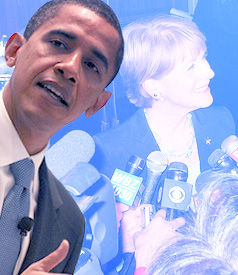Support justice-driven, accurate and transparent news — make a quick donation to Truthout today!
President Obama brought the energy from his 2008 campaign to Boston Sunday in a rally for Democrat Martha Coakley. She’s locked in a tight race with Scott Brown to succeed the late Ted Kennedy in the US Senate.
——
Boston – With only two days left in the race for Massachusetts’ open US Senate seat, President Obama delivered exactly what Democratic candidate Martha Coakley was hoping for: the potential for a momentum shift.
In recent weeks, Republican Scott Brown had turned the race toward the economic issues that are angering so many voters: high unemployment numbers, worries about healthcare reform, and the soaring federal deficit.
His success has imperiled Mr. Obama’s agenda. If he wins – and weekend polls showed the race even – the Democrats will lose their filibuster-proof 60-seat majority in the Senate.
Led by Obama Sunday, Ms. Coakley tried to turn the voters’ anger on its head. The frustration was justified, they said, but it was misplaced.
“We have had one year to make up for eight,” a dressed down Obama told the crowd, referencing the eight years of the Bush administration. “It hasn’t been quick, it hasn’t been easy…. But we’ve begun to deliver on the change you voted for.”
It was his exhortation to motivate Democrats and independents with sour memories of the Bush years: “We don’t want to go backwards to the policies that got us into this mess in the first place,” he said.
Coakley the “Incumbent”
It was also a clear attempt to change how Massachusetts voters view Coakley.
Without an incumbent in the race to fill the seat vacated by the late Sen. Edward Kennedy, Coakley has become a stand-in for Washington in many voters’ minds. She is Massachusetts’ attorney general and is well recognized in the state.
As such, she is suffering from the anti-incumbent attitude currently sweeping much of the nation. Mr. Brown has worked to emphasize this image, calling Coakley a “machine politician” at a rally timed to coincide with Obama’s.
“Now voters think a vote for her is a vote for what’s going on in Washington,” says Dan Payne, a Democratic media consultant based in Massachusetts. “She’s got to deal with Washington issues that she had never intended to be a part of her campaign.”
With Sunday’s rally and a similar event Friday with former President Bill Clinton, Coakley sought to turn those connections to her advantage. Obama brought to the Coakley campaign some of the enthusiasm that led him to victory in 2008.
A crowd 1,500 strong chanted “fired up, ready to go” – a slogan from Obama’s 2008 presidential campaign – while waiting for the event to begin and screamed “We love you Barack!” during pauses in his speech. Another 2,500 people watched a live broadcast in a Northeastern University student center nearby, and still thousands more were turned away, the Coakley campaign said.
The Importance of Obama
Indeed, for many Massachusetts voters, who voted Obama into office in 2008 by a 26-percentage point margin over Sen. John McCain, just having the president campaign in the state was enough to make an impression.
“It let me know how serious it is,” says Jeremy Smith, a graduate student at the Massachusetts Institute of Technology in Cambridge. Mr. Smith wasn’t planning to vote before Obama’s visit but says that now, even though he wasn’t able to make it into the rally, he plans to cast a ballot for Coakley on Tuesday.
“Living in a heavily blue [Democratic] state, you can lose sight of the fact that your vote matters,” said Smith, who volunteered for Obama’s presidential campaign. “If it wasn’t serious to Obama’s agenda, he wouldn’t have come.”
Steve Moran works in the health insurance industry and said he was also undecided before Sunday’s rally. “I hadn’t made a clear choice,” he said. But after attending the rally, he said he will likely vote for Coakley.
“It’s important enough to bring the president here,” he explained.
That’s exactly the message Obama hoped to impart.
“If you were fired up in the last election, I need you more fired up in this election,” he said.
Holding Trump accountable for his illegal war on Iran
The devastating American and Israeli attacks have killed hundreds of Iranians, and the death toll continues to rise.
As independent media, what we do next matters a lot. It’s up to us to report the truth, demand accountability, and reckon with the consequences of U.S. militarism at this cataclysmic historical moment.
Trump may be an authoritarian, but he is not entirely invulnerable, nor are the elected officials who have given him pass after pass. We cannot let him believe for a second longer that he can get away with something this wildly illegal or recklessly dangerous without accountability.
We ask for your support as we carry out our media resistance to unchecked militarism. Please make a tax-deductible one-time or monthly donation to Truthout.
